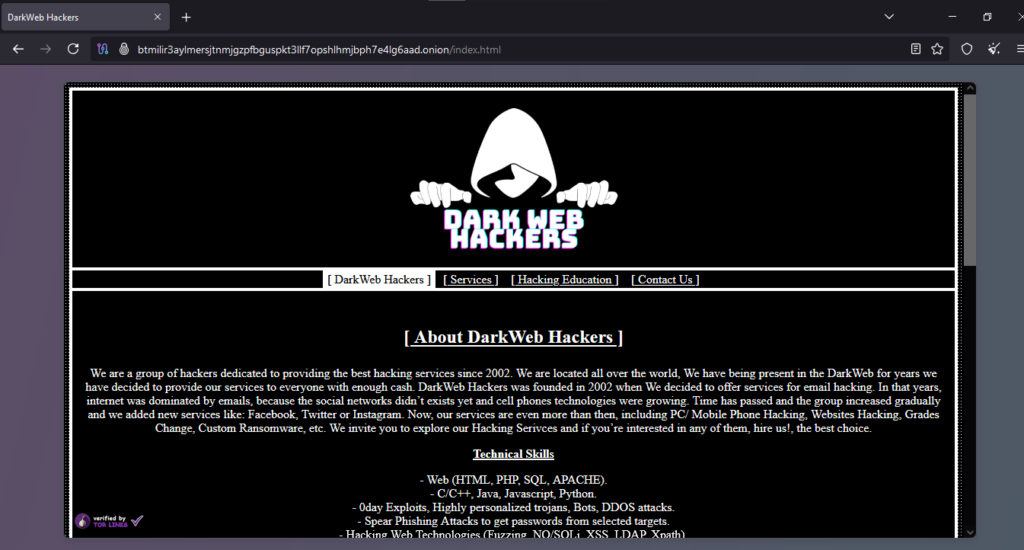Table of Contents
ToggleDark Web Hackers – TOR Scam Report (8)
Onion Link : http://btmilir3aylmersjtnmjgzpfbguspkt3llf7opshlhmjbph7e4lg6aad.onion/index.html
Scam Report Date : 2024-11-18
Client Scam Report Breakdown
Original Scam Report :
The client’s report describes an unsuccessful transaction on a website offering iPhone hacking services. They state: “I started the order to hack an iPhone on the website, I paid in bitcoins and despite repeated requests, my order was not carried out and I did not receive any further information about it.” This account reveals that the client initiated and paid for a hacking service using Bitcoin (BTC), but the promised service was not delivered. Moreover, the lack of communication after payment suggests deliberate avoidance or neglect on the platform’s part, which is consistent with fraudulent schemes. The report highlights frustration due to unmet expectations and ignored follow-ups, a common scenario in online scams.
2. Defining Terminology and Scam Tactics
The terms and processes mentioned in the report provide insight into the scam. The client refers to hacking an iPhone, an illegal activity involving unauthorized access to a device’s data or systems. Websites offering such services often exploit the anonymity of the internet to attract users looking for unethical solutions. These platforms are frequently fraudulent, promising impossible or illegal results to scam users out of their money.
The mention of Bitcoin (BTC) is significant because cryptocurrency transactions are irreversible and pseudonymous, making them a preferred payment method for scammers. Once the client transferred the payment, the funds became irretrievable, regardless of whether the service was provided. The scammer’s lack of response to repeated follow-ups exemplifies a classic tactic where fraudsters cease communication to avoid accountability. The phrase “despite repeated requests” reflects the client’s attempts to resolve the issue, highlighting the scammer’s complete disregard for communication or support.
3. Analysis and Recommended Actions
This report underscores several red flags indicative of online scams. First, the very nature of the service—a promise to hack an iPhone—raises ethical and legal concerns, as legitimate services would not offer such options. The use of Bitcoin for payment, while common in legitimate transactions, is a known tool for scammers due to its untraceable nature when misused. Combined with the lack of communication after payment, these elements paint a clear picture of fraudulent intent.
For individuals encountering similar situations, prevention is critical. Users must avoid engaging with platforms advertising illegal services, as these are often traps to exploit vulnerable or uninformed individuals. When using cryptocurrency for any transaction, it is essential to verify the legitimacy of the platform and the service being offered. If a scam has occurred, the victim should document all transaction details, including Bitcoin wallet addresses and communication records, and report the incident to law enforcement or cryptocurrency fraud monitoring organizations such as CipherTrace or Chainalysis.
More broadly, this case emphasizes the importance of ethical online behavior and awareness of scam tactics. Scammers prey on individuals seeking unconventional solutions, leveraging anonymity and irreversible payment systems to carry out their schemes. By educating users about online risks and the consequences of participating in unethical activities, the frequency and impact of such scams can be significantly reduced.






